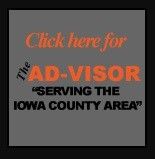March 1, 2024 at 10:55 a.m.
Reductions in state aid leave taxpayers with few choices
Dear Editor;
As Barneveld and many other area communities head toward referenda to raise their levy limits for operational expenses, many residents might be asking themselves, ‘Do I want to vote for something that will raise my taxes?’
As it turns out, because of what state lawmakers have been doing over the last decade or so, we don’t have much choice. We pay higher property taxes and have a school in our community or we pay higher property taxes and send our children to a school somewhere else. The choice is relatively simple.
A good friend of mine, Jim Raymond, has been a school board member in Edgerton for nearly 30 years in two different segments. He initially joined the school board in 1984, at which time Edgerton and many other schools received 60 to 70 percent of their funding from property taxes. As he explained in a recent letter to his community’s local newspaper, this became a very heavy burden, so in the 1990s, Gov. Tommy Thompson and the state Legislature decided to change school funding to two-thirds coming from state aid. The state receives most of its funds from sales and income taxes, so it was felt this was a more equitable funding source.
That state aid formula worked reasonably well for many years, Jim notes, as the two-thirds state funding was adjusted annually for inflation. These adjustments came in the form of $200 to $300 per-student increases and it came with an established revenue cap.
During most of the past decade, however, the state has frozen the annual adjustments in the revenue cap. In most years, the revenue cap was frozen at a zero increase, and there has never been even one year in which the revenue cap increased to the level of annual inflation. Instead of continuing the state-aid formula that was working, state legislators forced school districts to go directly to the public and pass operational referenda that raise the revenue caps in their specific district, just to meet increasing yearly expense increases such as teacher salaries and transportation services.
This year, nearly all of the school districts in southwest Wisconsin will be going to taxpayers asking them to approve referenda to balance school checkbooks.
As Jim notes in his letter, “It is an awful way to finance public education, as it makes the local school district very vulnerable if the referendum should fail.” It also forces the funding of education back onto the property tax in an ever-increasing way at a time when state revenues from sales and income taxes are showing as much as $7 billion in surpluses.
It’s an election year, so legislators have even talked about sending state residents a $100 check, opting to spend some of the surplus in that way instead of providing extra funding to schools that are hurting.
“As a school board member with six grandchildren in the district, it makes me more than a little annoyed that the state has put us in this position,” Jim says.
If the Barneveld referendum fails, the school will be affected quite negatively, from class size increases to staff reductions to deferred maintenance and a reduction in athletic and fine arts opportunities. Staff members need to be paid a competitive wage or they will move to a school district that will pay them more, resulting in lower quality education here.
Twenty-five years ago, referenda were held to allow school districts to build new facilities. Unfortunately, the state Legislature has now pushed school districts into the position where they must come to the public every five years or so to fund their operational budgets.
This isn’t right, but for now it’s the law. So think about the options when you go to the polls in April. And with it being an election year, hold our state elected officials accountable for their actions when you see them out campaigning. Ask them if they will do something to change the state aid formula to help struggling school districts when the Legislature convenes in January of 2025.
I am not looking forward to a higher tax bill any more than anyone else, but I will be voting in favor of the operating referendum in April.
Jim Massey
Town of Brigham resident

